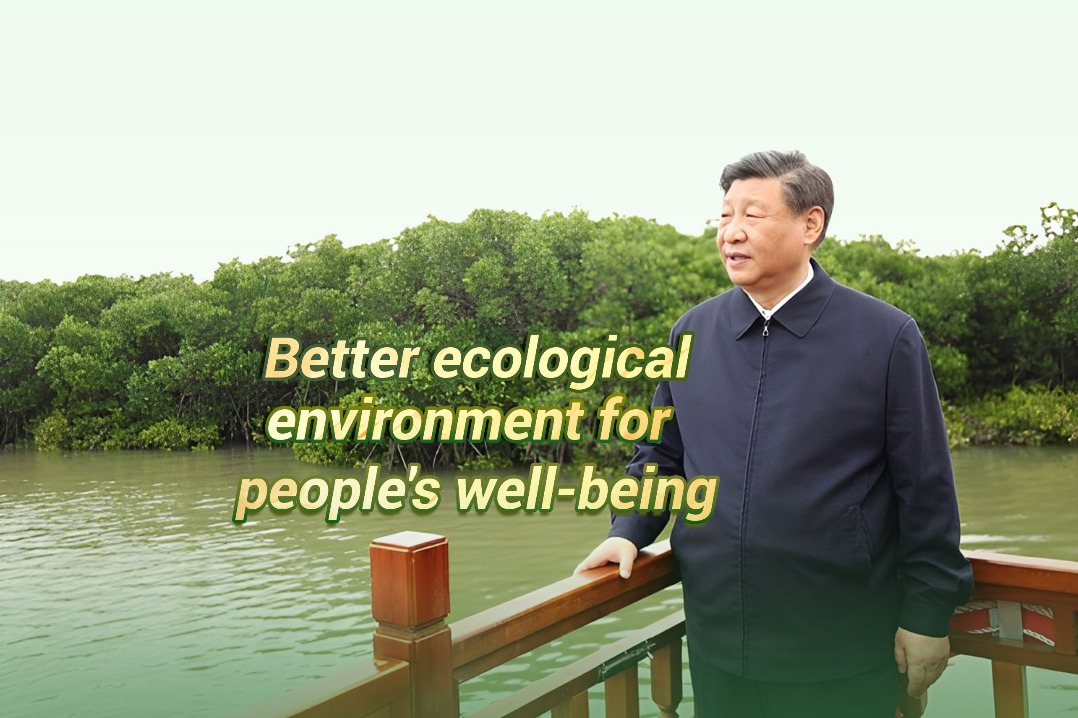Caught in a bind


Downturn in relations with China is symptomatic of difficulties the EU is facing
In the face of China's rapid rise, the European Union has adopted a three-pronged approach — as a partner for cooperation and negotiation, an economic competitor, and a systemic rival. The two sides have had increasing divergences in the political area. Overall, the EU views China less like a partner for cooperation, more like a systemic rival. In particular, since the outbreak of the COVID-19 pandemic and the Ukraine crisis, ideology has gained a firmer foothold in the EU's China policy. The EU thinks it shouldn't be "over-reliant" on China. The recently unveiled European Economic Security Strategy, Germany's National Security Strategy and the EU's Critical Raw Material Act are all clearly targeted at China.
The change in the bloc's attitude toward China and political divergences are felt in every aspect of bilateral relations. However, due to the two sides' economic interdependence, such political problems have had limited negative impacts on bilateral economic relations. According to the bloc's official statistics agency Eurostat, China overtook the United States to be the EU's biggest trading partner for the first time in 2020, the year when the COVID-19 pandemic broke out, when EU imports from China increased by 5.6 percent to 383.5 billion euros ($413.8 billion), while exports to China rose by 2.2 percent to 202.5 billion euros. In 2022, when the Ukraine crisis broke out, EU imports from China surged by 32.1 percent to 626 billion euros, while EU exports to China grew by 3 percent to 230.3 billion euros.
It's evident that economic codependency is the reason behind the bilateral economic and trade ties. The two sides' divergences over events of global significance, such as the COVID-19 pandemic and the Ukraine crisis, have not reversed the rising trend of bilateral economic and trade ties.
But China-EU trade relations have been confronted with new challenges since the start of the year, despite great significance to both sides.
In the first half of 2023, bilateral trade between China and the European Union totaled $400.58 billion, down by 4.79 percent year-on-year. Among that, Chinese exports to the EU totaled $259.32 billion, down by 6.49 percent and Chinese imports from the EU totaled $141.25 billion, down by 1.49 percent year-on-year.
Following the energy crisis and high inflation in 2022, the EU has been mired in sluggish growth, casting a shadow over China-EU economic and trade relations.
First, the EU's high inflation is sticking around. Despite numerous interest rate hikes by the European Central Bank in the wake of the EU's double-digit inflation rate in 2022, inflation in the eurozone remained above 5 percent in the first half of 2023.Sustained high inflation has lowered the real income of EU residents, resulting in a decrease in their purchasing power and thus consumer demand. The high inflation is likely to force the European Central Bank to raise interest rates further, putting more downward pressure on the economy.
Second, business insolvencies in the EU have hit record highs. In the second quarter of 2023, the number of bankruptcy declarations of EU businesses grew by 8.4 percent compared with the previous quarter, the highest level since the start of the data collection in 2015, and marking a consecutive increase for the sixth quarter in a row, according to Eurostat data released in August 2023.
Third, as the EU's economic engine for decades, Germany recently had a weaker economic performance than the EU's performance as a whole, as the energy crisis in Europe has dealt a heavy blow to the German economy and rising production costs have taken a toll on the competitiveness of German companies. According to a report from the German Institute for Economic Research, the direct investment outflows from Germany in 2022 were around 125 billion euros higher than the investments made in Germany in the same period, topping the 46 countries listed in the report.
Amid sluggish growth and weak demand, EU imports have declined as a whole. Eurostat data show that EU imports declined by 10.4 percent in the first half of 2023, a rate much higher than the 6.49 percent decline in EU imports from China during the same period.
The downturn in China-EU economic and trade relations is also related to the global economic environment, particularly the restructuring of industry chains in the Asia-Pacific region.
In recent years, alongside the industry chain restructuring and trade diversion in the Asia-Pacific region, China's exports to the US and the EU have been decreasing while its exports to Southeast Asia have been increasing.
In the first half of this year, the Association of Southeast Asian Nations remained China's biggest trading partner, with the bilateral trade in goods rising 5.4 percent year-on-year to 3.08 trillion yuan ($430.28 billion), representing 15.3 percent of China's total foreign trade during the period. This reflects the resilience of China's industry chains and its increasingly close economic ties with ASEAN member states.
The EU's trade policy toward China is an epitome of the changes in the global economic environment.
Over the past few years, amid rising inequality and economic woes, developed capitalist countries have taken stock of neoliberalism's successes and failures. Since Joe Biden took office as president, the US government has been increasing government interventions in the economy — strengthening industrial policies at home and implementing protectionist measures against other countries. "Bidenomics", as it has been dubbed by some US media, has gradually become a consensus of both parties in the US, and a number of laws based on it have been passed. Under the influence of US policy, the EU can hardly stick to its previous stance on free trade and protectionism in the EU may become more pronounced.
As an open economy, however, the EU cannot give up access to China's mega-sized market for exports, and importing fine and affordable products from China will help the bloc curb inflation.
Going forward, if the EU economy continues to worsen, it will have to rethink its protectionist policies, such as anti-subsidy measures, to prevent China's countermeasures from further hurting the ailing economy. If the bloc's economic growth rebounds, its demand for Chinese products will also recover as the EU's domestic demand recovers.
Economically or strategically, China-EU relations will inevitably be influenced by China-US relations. In the wake of the Ukraine crisis, Europe has further increased its dependency on the US in terms of energy supplies and security issues. But the US and the EU are beset with numerous contradictions, such as serious divergences over the US Inflation Reduction Act, resulting in the EU's limited endeavors to join hands with the US to counter China. For China, there is still much room to try and improve relations with the EU.
The author is a research fellow at the China Institutes of Contemporary International Relations. The author contributed this article to China Watch, a think tank powered by China Daily.
The views do not necessarily reflect those of China Daily.
Contact the editor at editor@chinawatch.cn


































